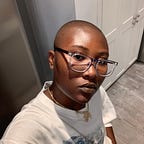The Body as a Relationship
In reflecting on themes like spirituality, consent and physical touch, reflecting on my embodiment, on what it means to be embodied felt like the natural next step. Beyond narratives and metaphors of gender and dysphoria however, I’ve been thinking about the literal fact of possessing a body. I’ve been thinking about what this body is, what it’s made of, what it does. Beyond narratives of biology or ability however, I’ve been thinking about my body and my relationship to it.
I’ve heard bodies referred to in many ways — a prison of flesh and bone, bacteria and primordial ooze, a mixture of dirt and stars. But when my boss asked the question, “What is a body?” All my answers seemed to point to an overarching theme, that the body is a relationship — to self, to space, to others and to the world.
I’ve always thought of my body in the literal, physical sense. My body carries me from place to place, my body is like a machine that requires fuel and fine-tuning. Bodies are simultaneously a stable, knowable external self and the witnessing of one’s one evolution.
This body is all I’ve ever known and yet it has done nothing but change since I first came into its possession.
Somehow it remains familiar throughout (the majority of) its changes (barring the horror that was going through puberty and unnamed dysphoria). In this way, the body is a relationship to change, and an exercise in adaptability.
Beyond being something we wear and are, the body is also a site of sensuality. It allows us to experience the world through our five senses and I think sometimes we become numb to its wonder. The scent of freshly baked brownies, the feeling of a hot shower, the sound of soul-tickling music, the taste of a juicy orange, the sight of people I love — these are all things I take for granted because my body simply allows me to know and experience them, but they’re all privileges in their own right.
Of course if I’m being morbid, the body could be understood as death embodied — decaying from the very moment they come into existence. It provides us a home, with the condition that it will crumble before our eyes. The capacity to live and to die however, is an example of our connection to the Divine. We’re sort of like robots with the breath of life and the ability for self-consciousness. In this way, the body is a relationship to Source, to the Creator, to the universe.
Consciousness, spirituality, and divinity are all what take our physical selves into relationship with the metaphysical. The human body is not just a piece of meat, but a home to something inside ourselves. The body makes tangible that which we cannot fully know, touch or imagine — the self. Our bodies are the most easily recognizable aspects of ourselves.
We could and likely will spend entire lifetimes trying to understand ourselves, our minds, our motivations, but a body is right here. A body is an anchor.
I see the body as a collection of ideas. Someone somewhere once said something about telling ourselves stories about ourselves for sustenance — or something like that. The body is what holds and carries these stories. Our bodies are like time capsules, full of memories and stories of days gone by. We hold our own stories, just as we carry stories and histories of our ancestors and generations that came before us. In this way, bodies can be understood as a relationship to time.
These time capsules are also our ways of being in the world. The body is quite literally what shows up in our place. The body is a thing to be seen in. Our bodies are our only method of communication with the world — aside from actual communication. In this way the body becomes the ultimate representation of self.
In attempting to know and communicate who we are, not only to ourselves but to others, we use the body as a site of individuation. Although the body is in and of itself already this place of and for the individual, we can spend lifetimes trying to possess our bodies more wholly — trying to make them ours, trying to communicate our knowledge and possession of this self.
It turns out I am incapable of thinking about the body without thinking about queerness. Queerness, in some respects, allows us to embody ourselves more deeply. Queerness can be the ultimate act of knowing and possessing one’s deepest self. Queerness, in other respects, can make the body an alienating thing to experience and inhabit. I think the power is in the possibility that bodies provide us — that queerness provides us.
Queerness forces us to see ourselves, to see our bodies, to see our expressions, and consequently forces us to make something out of what we see. Queerness urges us to make ourselves in our own image. Queerness reminds us we have authority and autonomy over our bodies.
We are more than our bodies. Our bodies are defined by more than their abilities. Our queerness comes to us from somewhere deeper than the body.
Our bodies are relationships and facilitate our relationships with others, but most important are relationships to ourselves and to our bodies. Looking at bodies holistically and understanding ourselves beyond our physical dimensions, can allow us to appreciate ourselves and our bodies for all that we are, and all that we are capable of.
